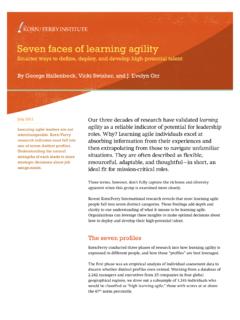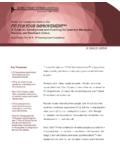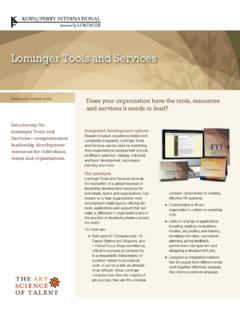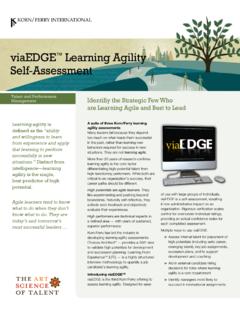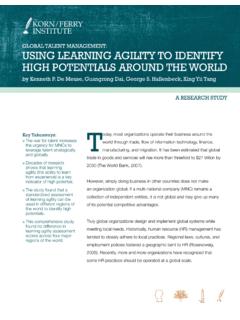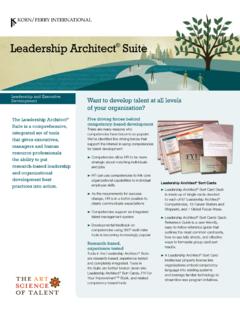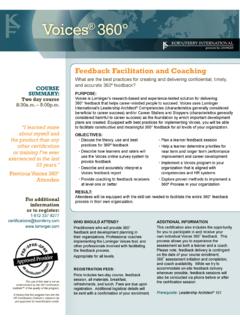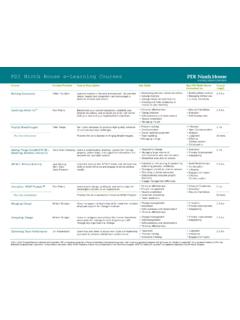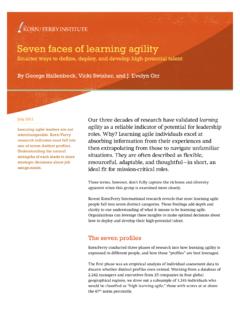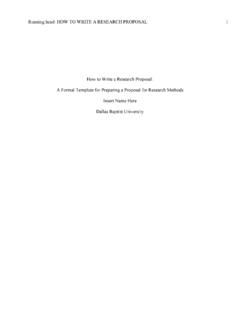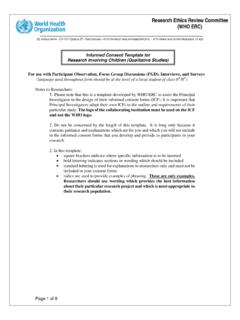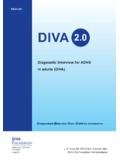Transcription of Sample Candidate Sample Account Executive role …
1 Sample Candidate Sample Account Executive role interview ARCHITECT Express E. PL. IMPORTANT NOTE FOR USERS OF interview ARCHITECT Express interview ARCHITECT Express is a human resources tool designed to assist employers with the interviewing process. interview ARCHITECT Express is not intended to constitute legal advice. If legal advice is desired, users of the materials should seek the services of competent legal counsel. M. interview ARCHITECT Express assists employers in the selection of the best-qualified internal or external candidates. Employment laws in the country, state, province or locality in which the materials are used may contain prohibitions with regard to certain inquiries during the pre-employment interview process. Lominger Limited, Inc. cannot be responsible for implementation and use of the materials that deviates from these legal requirements.
2 Users of the materials should become familiar with applicable laws restricting the types of inquiries which can be made in pre-employment interviews and use the materials accordingly. SA. Candidate : Sample Candidate interview ARCHITECT Express Position: Sample Account Executive role Interviewer: HR Date of interview : This text area may be used to communicate with your interviewers. This is a customized text box to record any information. You may use this area to provide context around the job or a reminder of the job description. You may also use this area for giving interviewing tips to perhaps less skilled or experienced interviewers. You may also want to communicate to the interviewer what the next steps will be for the Candidate to be sure this is communicated at the conclusion of the formal parts of the interview itself. E. PL. M. SA. Copyright 2011 Lominger International: A Korn/Ferry Company.
3 All Rights Reserved. Candidate : Sample Candidate interview ARCHITECT Express Position: Sample Account Executive role Interviewer: HR Date of interview : Dealing with Ambiguity (2). Can effectively cope with change; can shift gears comfortably; can decide and act without having the total picture; isn't upset when things are up in the air; doesn't have to finish things before moving on; can comfortably handle risk and uncertainty. MAIN interview QUESTION: (Pick one.) * OK for Campus Tell me about a time when you had to make a decision and the information available was totally inadequate.*. Give me an example of how your work habits change when you don't know exactly what to do. SITUATION (Record main points to describe situation.). E. LEARNING PROBES: A. ACTIONS How did you approach it? How did you do it? (Listen for specific action steps.). PL. B. THINKING Explain your thinking - why you selected that approach.
4 Why did you choose to do it that way? (Listen for rationale and consideration of alternatives.). C. OUTCOME What was the result? What was the impact? D. LEARNINGS What did you take away from that experience? (Listen for principles or rules of thumb.). M. E. APPLICATION Describe a time when you used those lessons in different situations. IDENTIFY THEMES FROM Candidate 'S RESPONSES: (Check all that you are hearing.). NEGATIVE THEMES TO WATCH OUT FOR: POSITIVE THEMES TO LOOK FOR: SA. Inflexible; doesn't make changes along the way Gathers information and experiments High need for analysis and information before acting Comfortable not having a complete picture before acting High need for structure and data Willing to take chances; moves forward Strong need to finish everything before moving on Flexible, adaptable; will shift gears High need to stay in comfort zone Maintains calm in uncomfortable situations (Overuse) Takes action and makes decisions without enough data OVERALL COMPETENCY RATING: Where would you rate this person on this competency?
5 1. Clearly misses requirements 2. Less than requirements 3. Meets requirements 4. Exceeds requirements 5. Far exceeds requirements Overuses Copyright 2011 Lominger International: A Korn/Ferry Company. All Rights Reserved. Candidate : Sample Candidate interview ARCHITECT Express Position: Sample Account Executive role Interviewer: HR Date of interview : Composure (11). Is cool under pressure; does not become defensive or irritated when times are tough; is considered mature; can be counted on to hold things together during tough times; can handle stress; is not knocked off balance by the unexpected; doesn't show frustration when resisted or blocked; is a settling influence in a crisis. MAIN interview QUESTION: (Pick one.) * OK for Campus Describe a crisis you had to handle.*. Describe a time when you were ordered by a person in power to do something that you didn't want to do.
6 *. SITUATION (Record main points to describe situation.). E. LEARNING PROBES: A. ACTIONS How did you approach it? How did you do it? (Listen for specific action steps.). PL. B. THINKING Explain your thinking - why you selected that approach. Why did you choose to do it that way? (Listen for rationale and consideration of alternatives.). C. OUTCOME What was the result? What was the impact? D. LEARNINGS What did you take away from that experience? (Listen for principles or rules of thumb.). M. E. APPLICATION Describe a time when you used those lessons in different situations. IDENTIFY THEMES FROM Candidate 'S RESPONSES: (Check all that you are hearing.). NEGATIVE THEMES TO WATCH OUT FOR: POSITIVE THEMES TO LOOK FOR: SA. Goes silent and passive under pressure Balanced description of situation; uses objective language Lets emotions, anxieties and frustrations show Self-awareness aware of own emotions at the moment Becomes cynical, critical and judgmental Able to work through a situation without showing anger or irritation Gets easily overwhelmed and overreacts Knows the danger signs when he/she is about to let emotions guide actions; can describe triggers and manage them Becomes inflexible, aggressive and rigid Clearly includes self and role in the situation (Overuse) Can't relate to the emotions of others; seems impersonal OVERALL COMPETENCY RATING: Where would you rate this person on this competency?
7 1. Clearly misses requirements 2. Less than requirements 3. Meets requirements 4. Exceeds requirements 5. Far exceeds requirements Overuses Copyright 2011 Lominger International: A Korn/Ferry Company. All Rights Reserved. Candidate : Sample Candidate interview ARCHITECT Express Position: Sample Account Executive role Interviewer: HR Date of interview : Composure (11). Is cool under pressure; does not become defensive or irritated when times are tough; is considered mature; can be counted on to hold things together during tough times; can handle stress; is not knocked off balance by the unexpected; doesn't show frustration when resisted or blocked; is a settling influence in a crisis. MAIN interview QUESTION: (Pick one.) * OK for Campus Tell me about a time when someone or something caught you by surprise and caused your goals to be blocked.*. Tell me about a time when you intervened to help settle a heated dispute.
8 *. SITUATION (Record main points to describe situation.). E. LEARNING PROBES: A. ACTIONS How did you approach it? How did you do it? (Listen for specific action steps.). PL. B. THINKING Explain your thinking - why you selected that approach. Why did you choose to do it that way? (Listen for rationale and consideration of alternatives.). C. OUTCOME What was the result? What was the impact? D. LEARNINGS What did you take away from that experience? (Listen for principles or rules of thumb.). M. E. APPLICATION Describe a time when you used those lessons in different situations. IDENTIFY THEMES FROM Candidate 'S RESPONSES: (Check all that you are hearing.). SA. NEGATIVE THEMES TO WATCH OUT FOR: POSITIVE THEMES TO LOOK FOR: Goes silent and passive under pressure Balanced description of situation; uses objective language Lets emotions, anxieties and frustrations show Self-awareness aware of own emotions at the moment Becomes cynical, critical and judgmental Able to work through a situation without showing anger or irritation Gets easily overwhelmed and overreacts Knows the danger signs when he/she is about to let emotions guide actions; can describe triggers and manage them Becomes inflexible, aggressive and rigid Clearly includes self and role in the situation (Overuse) Can't relate to the emotions of others; seems impersonal OVERALL COMPETENCY RATING: Where would you rate this person on this competency?
9 1. Clearly misses requirements 2. Less than requirements 3. Meets requirements 4. Exceeds requirements 5. Far exceeds requirements Overuses Copyright 2011 Lominger International: A Korn/Ferry Company. All Rights Reserved. Candidate : Sample Candidate interview ARCHITECT Express Position: Sample Account Executive role Interviewer: HR Date of interview : Decision Quality (17). Makes good decisions (without considering how much time it takes) based upon a mixture of analysis, wisdom, experience, and judgment; most of his/her solutions and suggestions turn out to be correct and accurate when judged over time; sought out by others for advice and solutions. MAIN interview QUESTION: (Pick one.) * OK for Campus Describe a time when you made a major decision and were really pleased with the outcome.*. Give me an example of the decision-making process you went through to hire someone.
10 SITUATION (Record main points to describe situation.). E. LEARNING PROBES: A. ACTIONS How did you approach it? How did you do it? (Listen for specific action steps.). PL. B. THINKING Explain your thinking - why you selected that approach. Why did you choose to do it that way? (Listen for rationale and consideration of alternatives.). C. OUTCOME What was the result? What was the impact? D. LEARNINGS What did you take away from that experience? (Listen for principles or rules of thumb.). M. E. APPLICATION Describe a time when you used those lessons in different situations. IDENTIFY THEMES FROM Candidate 'S RESPONSES: (Check all that you are hearing.). NEGATIVE THEMES TO WATCH OUT FOR: POSITIVE THEMES TO LOOK FOR: SA. Makes quick decisions without analysis Objectively gathers information Relies too much on self and close in information Knows priorities Lack of clear issue definition Identifies key factors/themes in the decision Not orderly in thinking Thorough question/consideration of the nature of the decision Feelings play too large a role Defines issues/problems clearly; sought out for advice by others (Overuse) Perfectionist, has overriding need to be right; analyzes excessively OVERALL COMPETENCY RATING: Where would you rate this person on this competency?
